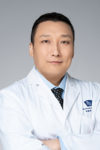
 Minimally Invasive Digestive Disease Department (MIDDC)
Minimally Invasive Digestive Disease Department (MIDDC)
MIDDC is part of the Center of Excellence at Beijing United Family Hospital. It consists of traditional gastroenterology, gastrointestinal surgery and hepatobiliary surgery. Professor Li Wen serves as department chief and is a world-renowned expert in gastroenterology and former Deputy Director of Gastroenterology at the Chinese PLA General Hospital. Beyond Professor Li, the MIDDC team is made up of experts from United Family, including Professor Derek O’Reilly, a certified general surgeon by the Royal College of Surgeons of England, and from top local hospitals like Professor Qian Jiaming from the Gastroenterology Department of Peking Union Medical College Hospital and Professor Wang Qiusheng from the Surgery Department of Peking University People’s Hospital. The department’s goal is to diagnose and treat diseases using internal and external experts for the best possible results for patients.
In addition to traditional treatments for digestive diseases (upper and lower digestive tract and hepatobiliary and pancreatic diseases), a minimally invasive concept of digestive endoscopic therapy is implemented to preserve the morphological and functional integrity of the diseased organs to the maximum extent. MIDDC can independently complete endoscopic diagnosis and treatment of multi-organ and multi-system diseases: ESD (endoscopic submucosal dissection), EUS (endoscopic ultrasound), POEM (peroralendoscopicmyotomy), STER (submucosal tunnel endoscopic resection), ERCP (endoscopic retrograde cholangiopancreatography), ERAT (endoscopic retrograde appendicitis therapy) and other procedures at the highest level. Further the department breaks down disciplinary barriers between internal medicine and surgery, changing the medical treatment mode of patient turnover into patient-centered care focused on individualized treatment plans. The combination of laparoscope-endoscopy, open surgery, and other treatments are also feasible for diseases related to the digestive system.
We have an easy-to-use patient portal where you can find a variety of information: booking, treatment, and payment for quick reference and patient privacy. The department utilizes the most advanced endoscopic equipment, including cleaning and disinfection machines. It also focuses on environmental factors, using high efficiency air disinfection purification systems to ensure clean air management.
The United Family Healthcare MIDDC is an international open platform that is focused on meeting the clinical needs of patients. It allows patients to choose doctors in the United Family Healthcare system as well as domestic and foreign experts to help provide the highest level of care and results.
OUR CLINICIANS


Wen LI
Chair of Gastroenterology at BJM and SZU


Jiaming QIAN
Chief Physician


Wei GENG
Gastroenterologist Hepatologist Chief Physician


Lin ZHANG
Section Chief of Integrative Medicine Chief Physician


Li ZHAO
Gastroenterologist Chief Physician


Leona LI
Gastroenterologist


Zantao WANG
Gastroenterologist、Endoscopist、Chief Physician


Jing YANG
Gastroenterologist Endoscopist Associate Chief Physician


Jing XIE
Internal Medicine Family Medicine Infectious Disease Specialist and Hepatologist
Service Scope
General gastroenterological diseases: treatment of upper and lower digestive tract, hepatobiliary, and pancreatic disease.
Digestive endoscopy related issues:
- Emergency endoscopic examination and treatment: upper and lower gastrointestinal bleeding (hematemesis and hematochezia), gastrointestinal foreign bodies.
- Gastrointestinal obstructions caused by early or advanced cancers of the esophagus, stomach, duodenum, colon, and rectum.
- Endoscopic treatment of achalasia of the cardia (POEM) and gastroparesis (G-POEM).
- Endoscopic treatment of gastrointestinal polyps, gastrointestinal mucosal dysplasia, and gastroesophageal reflux disease.
- Small bowel diseases (vascular malformations bleeding, stromal tumors, Crohn’s disease).
- Hepatobiliary and pancreatic diseases (obstructive jaundice caused by liver cancer, esophageal and gastric varices bleeding caused by liver cirrhosis, extrahepatic bile duct stones, cholangiocarcinoma and pancreatic cancer cause obstructive jaundice, chronic pancreatitis pancreatic duct stenosis, dilation and stones).
Endoscopic ultrasound:
- Puncture biopsy of mediastinal, retroperitoneal, and enlarged lymph nodes and masses.
- Submucosal lesions of the digestive tract such as the esophagus, stomach, and colon.
- Stages of digestive tract cancer and hepatobiliary pancreatic tumors.
- Diagnosis of unexplained ascites by endoscopic transgastric exploration under the guidance of ultrasound.
- Endoscopic stent implantation and transgastric fenestration for pseudocyst and wrap necrosis of pancreatitis.
- Endoscopic ultrasound-guided celiac plexus for the treatment of pancreatic pain.
- Endoscopic ultrasonography-guided transgastrointestinal cholangiopancreatographic stent drainage for treatment of ERCP failure.
Endoscopy related physical examination: Routine physical examinations, including regular and painless gastrointestinal endoscopy.
Digestive system health counseling.
Features
Joint Outpatient Gastrointestinal Surgery Service: we gather outstanding gastroenterologists, gastrointestinal surgeons and hepatobiliary surgeons while focusing on patients. Multi-disciplinary doctors “surround” patients with meticulous diagnosis and treatment, so as to solve the difficult digestive problems of adults/children and those considering surgery.
To formulate the optimal treatment plan for tumors in unique places (such as cardia, pylorus, duodenum, cecum, appendix, etc.), and solve problems combining laparoscopy and digestive endoscopy as well as minimally invasive surgery to maximize the protection of organ function when necessary.
- Endoscopic treatment for acute and chronic appendicitis.
- Endoscopic treatment for gallbladder polyps and gallstones, and double endoscopic combined treatment of gallbladder stones accompanied by bile duct stones.
- Diseases related to gastrointestinal tract diversion after gastrointestinal tract surgery (such as gastrointestinal tract stenosis, adhesion, blind loop syndrome, anastomotic leakage, cholangitis caused by reflux and esophagitis).
(中文) 为什么选择我们:




